At the end of 2022, in an effort to be more mindful about my media engagement and direct people to “the good stuff,” I wanted to write about all of my favorite books, games, shows, and music I experienced for the first time that year. So I sat down and spent a weekend writing that blog post.
The problem was that my original list contained 16 entries, which is, in hindsight, a lot of media to review in a couple of sittings. Too much media, even. New year’s day came and went, and the original incomplete blog post had sat on my computer ever since.
Committed to my mission to direct people to the good stuff, I had since decided to instead break down what would be my 2023 year-in-review post into a series of 4 posts, released every three months. However, as of the end of March this year, there were only two pieces of media that I felt particularly compelled to write about, which was not enough to warrant a full post. Three items is a list; two is an awkward pairing that invites the question, "why are you talking about these two unrelated things in relation to each other?"
And then, it recently occurred to me: what if I just padded this year’s quarterly media reviews with the reviews I already wrote for the stuff I liked in 2022? Problem solved. So here is the first in a series of reviews of my favorite pieces of media from, specifically, the past 17 months, and not any earlier. Out of my entire backlog of things I want to review, here’s six of them.
Few of these pieces came out in 2022 or 2023 itself, and as a result, this list better describes who I was in the past 17 months than the current zeitgeist. I’ve been at a stage at my life when, more so than usual, on many different fronts, I’ve been trying to figure out just what sort of person I am. Accordingly, a disproportionate number of the stories that’ll be featured across this series are focused on women’s experiences, especially queer women’s experiences, which are particularly meaningful to me right now. We all use stories to make sense of ourselves, but because actually good stories about trans women in particular are relatively scarce, I’ve often found myself without the types of basic narratives that many people get to take for granted. Which just happens to bring me to my first recommendation:
Sissy Bitches, Sissy Bitches II, and Cisness or Pleasure (Alice Stoehr)
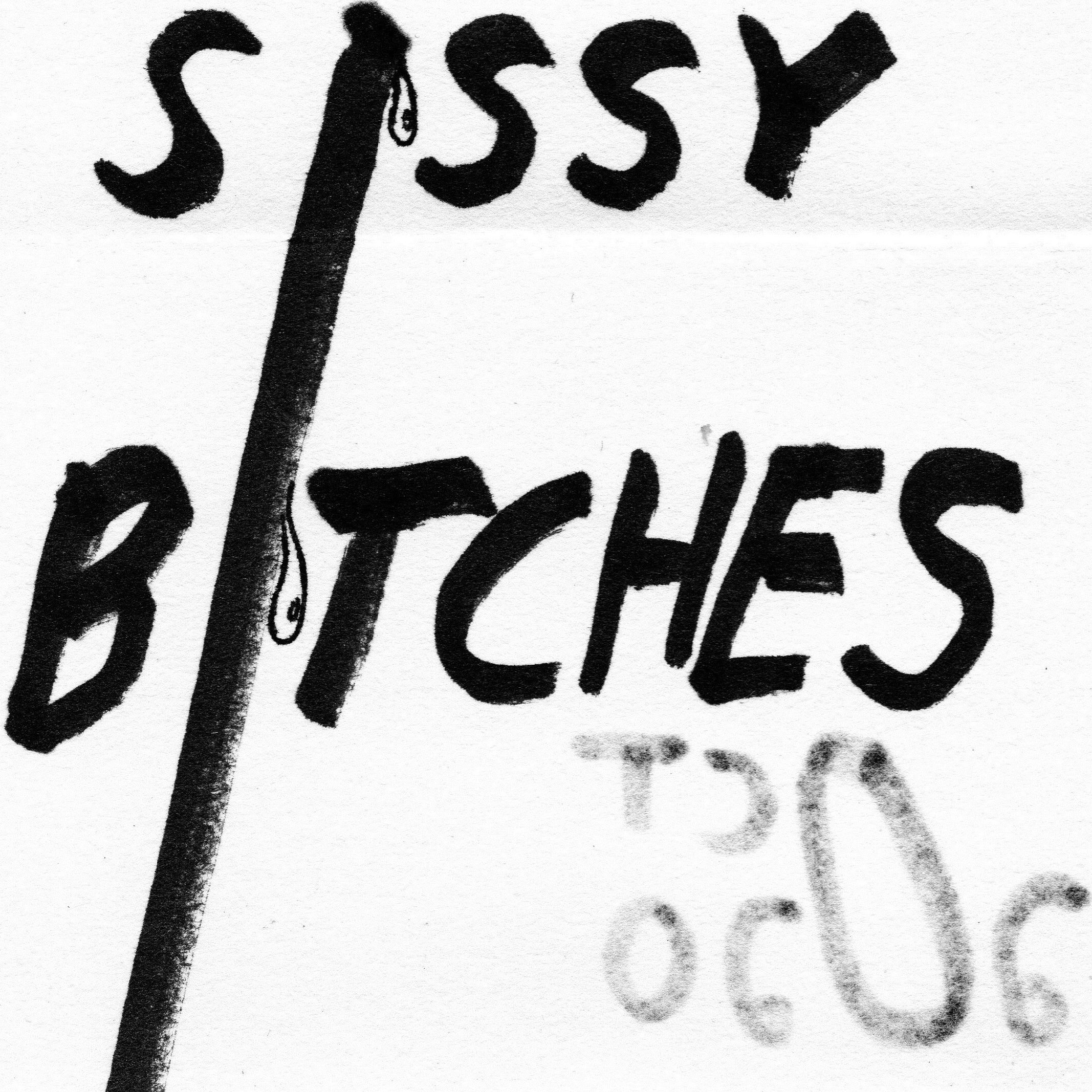
“All she knew was that she had to get away from trans girl shit, which meant maneuvering right into cis people shit, which was the only thing that could possibly be worse.”
Sissy Bitches, Sissy Bitches II: Nothing is bad, everything is dangerous, and Cisness or Pleasure are a series of short story collections about trans women by Alice Stoehr. Beyond just being a collection of compelling, well-written stories (the problem with doing a retrospective months later is that I can’t get much more specific here beyond “I remember it being good, trust me!”), what I appreciate most is the diversity of transfeminine experiences portrayed across them. The stories all occur within the same universe and share a cast of recurring characters, including, but not limited to, responsible trans women, pathetic trans women, self-loathing trans women, horny trans women, polyamorous trans women, confused trans women, kind trans women, clever trans women, alcoholic trans women, murderous trans women, and trans women in cults.
Disaster, in some form, strikes in nearly every story. Having a cast of dozens of typically flawed, but often sympathetic trans women of all stripes allows Stoehr to more fully explore both the complexities, ugliness, and joy of transfemme experience in a way that is hard to do with the more common alternatives of individual protagonists or tokenized side characters, both cases in which a single character bears the burden of making a statement about trans women as a whole.
While I want to give a heads up to interested readers that these stories are often raunchy, I think the depictions of trans women having sex are important given their general absence in mainstream culture. I took for granted until I read Sissy Bitches that, while I have been bombarded with descriptions of cis and straight sex my entire life, I had comparatively zero examples of transgender lesbians having sex to draw upon! Turns out that having those kind of stories is a super basic part of the human experience that most people never have to worry about, and not having them kinda sucks! Didn’t realize what I was missing until I found it.
In any case – if you need a rapid intake of dozens of (very good!) stories about trans women for whatever reason, Stoehr’s stories are great. You can download and read them for free from itch.
Ducks (Kate Beaton, 2022)
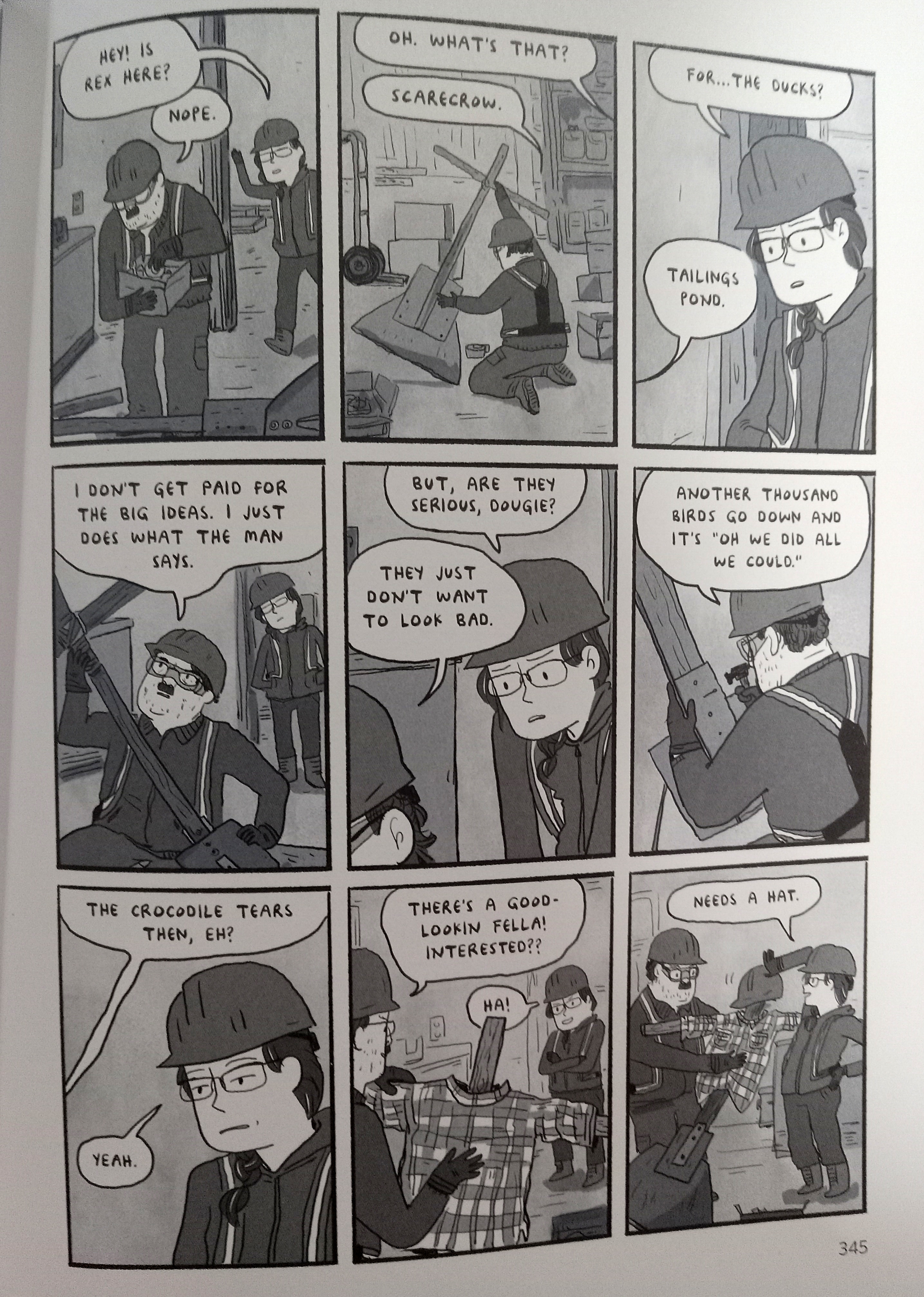
I was too lazy to use my scanner, so enjoy these low-quality photos I took of relevant pages
Ducks is a graphic memoir by Kate Beaton, best known for her webcomic Hark! A Vagrant. Fresh out of college in the mid-2000’s and desperate to pay off her student loans, Beaton leaves her home of Cape Breton (off the coast of Nova Scotia) to find work in the Alberta oil sands, an isolating, harsh, and overwhelmingly male work environment where she spends most of the following two years.
She details the bleakness of the oil sands, the people who worked there, the pervasively sexist workplace culture, her sexual assault, her struggles to pay off her student debt, and her complicity in environmental destruction with sharpness, deadpan humor, nuance, and empathy. In regards to her experiences with misogyny and sexual violence, she repeatedly raises the question of why the men she worked with acted the way that they did, contextualizing their behavior within the pressures of a lonely, unsafe, soul-crushing workplace.
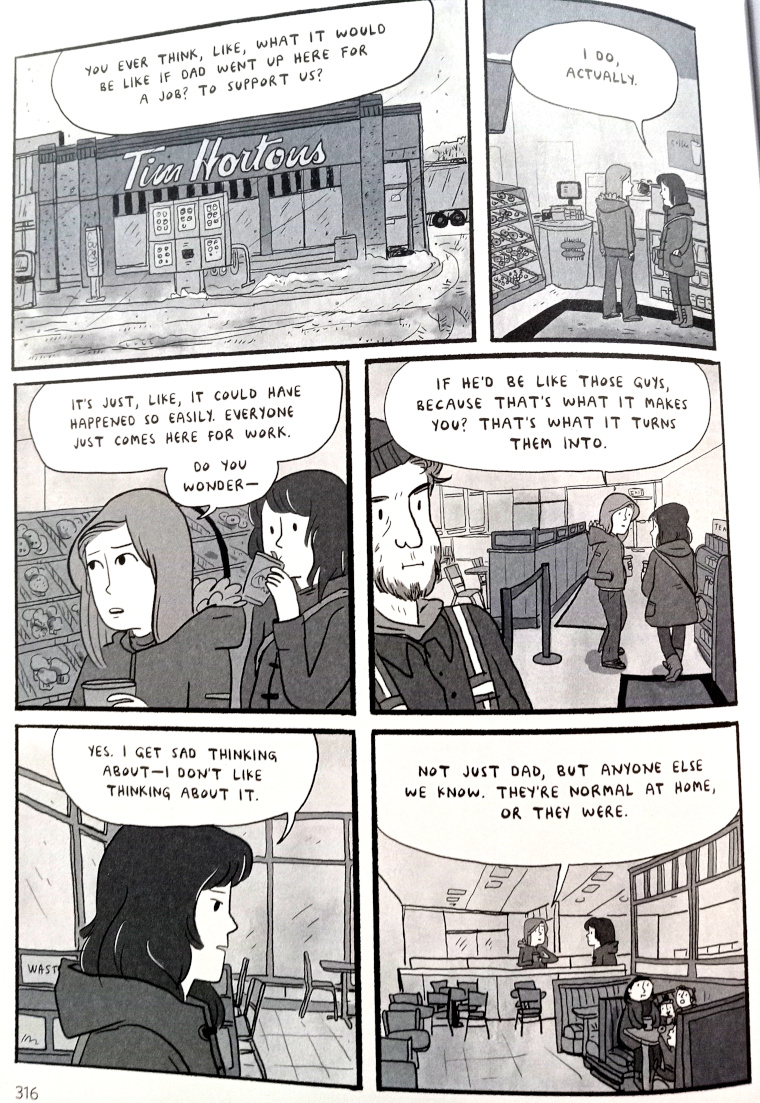
Beaton originally wrote Ducks as a short series of sketch comics that she had shared online back in 2014, so when I finally stumbled across a copy of the complete memoir earlier this year, I was ecstatic. It’s a standout work that was well worth the wait. Universally recommended.
Revolutionary Girl Utena (Be Papas, 1997)
(And by extension, Adolescence of Utena) (Be Papas, 1999)
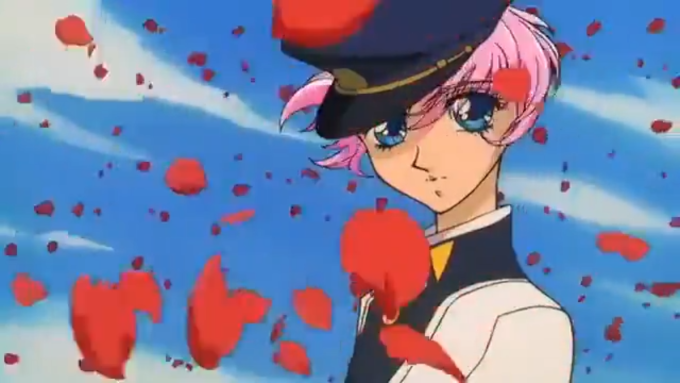
Utena is a show that begs to be picked apart and analyzed to death, so indulge me for a bit.
Utena Tenjou is a middle school student who has to regularly beat a bunch of people in sword fights (typically, student council members) in order to keep Anthy Himemiya, the so-called “Rose Bride,” out of their possession and earn the power to allegedly “revolutionize the world.” But all is not as it seems.
Revolutionary Girl Utena’s title is sometimes mentioned alongside Cowboy Bebop and Neon Genesis Evangelion as “one of those critically aclaimed, genre-defining anime of the 1990’s,” so while it is by no means obscure, it hasn't had nearly as large a following the other two. Which feels like a shame! I find Utena to be every bit as creative, rich, and socially relevant as its contemporaries.
I can partly understand why shows like Bebop and Evangelion have larger followings. Utena relies heavily on some of the tropes of the magical girl genre and action-adventure anime more broadly (transformation sequences, insert songs, formulaic episode structure), and while the show makes incredible use of these tropes thematically, they may not only seem strange to newcomers to the genre, but also make the early episodes especially feel dated when compared to the timelessness of Bebop and Eva’s presentation. Almost everything that made Bebop and Eva great shows was present in their opening episodes – for example, when Unit 01’s head spews blood at the start of Evangelion’s second episode, it communicates to the audience that Eva is not like other giant robot anime, since robots don't normally, y'know, bleed. The show's themes about trauma and interpersonal connection begin to develop from the onset.
By contrast, while Utena's surrealism and feminist themes are established in its first episode, setting up an aesthetically interesting but otherwise typical “girl power” story, it doesn’t begin to subvert audience expectations about its girl power premise until episode 11 at the earliest, and even then, it isn’t until the final third of the story when the writers really begin to deconstruct “the strong female protagonist” trope in full force. (And what a ride that final arc is. Holy shit.) While the show does signal from the first episode that it isn't "like other magical girl shows," it isn't entirely forthcoming about the most important ways in which it distinguishes itself. The show's premise and aesthetic may be intriguing to viewers from the get-go, but the first episodes, while enjoyable, don't do the rest of the show justice.
Unfortunately, any possible issues with presentation and accessibility aside, I suspect that the more pressing reason that Utena is so often overlooked is just that it’s a show about girls and gender roles and queerness and patriarchal oppression, and that just doesn’t sell, so we're made to believe.
It is hard to talk about what makes Utena so good because, 1), it is such a dense show and, 2), it is especially hard to talk about what makes the story so good without spoiling it. But it is worth going into the series blind, so I will try my best.
I was originally drawn to Utena because of the aforementioned simple queer “girl power” premise that it leads with – a sapphic girl dressed like a boy wants to become a prince (in the fairy tale sense, not the political one) who saves princesses, beating a bunch of dudes (and occasional gal) in sword fights. However, part of what makes Utena special is because of the way that it subverts that premise, calling the roles of “prince” and “princess” into question. A girl (Utena) can inhabit a male gender role (prince), but the hierarchy of princes and princesses (the patriarchy) remains intact. Even though Utena becomes of “one of the boys,” that alone is not enough to save herself nor Anthy from the patriarchy - she needs to do more.
(Speaking of antagonistic patriarchal forces – I can't talk about Utena without mentioning that Akio is easily one of the best-written anime villains I’ve ever had the displeasure of watching. No question. The manner in which he manipulates and abuses people is portrayed with a level of subtlety that is painful to watch. The show’s first antagonist, Saionji, is almost cartoonish by comparison in his explicitly misogynist worldview and propensity toward unambiguous public physical abuse, serving as a misdirection of sorts that sets the stage for Akio’s eventual appearance as the show’s true antagonist, an arguably more insidious, banal, and relevant avatar of patriarchal oppression. Akio is a piece of shit and I hate him.)
Much of Utena's storytelling is done visually, leaving fundamental pieces the of series' themes and narrative up to interpretation, making it just obtuse enough that it isn't heavy handed, but not so obtuse that it feels inaccessible. The line between symbolism and reality becomes increasingly blurred as the season progresses into increasing surrealism, but I think that the show does a great job of slowly acclimating the viewer to understanding the metaphors present in its not-entirely-literal fairytale world.
I think this unfortunately makes Utena easy to misinterpret. Whether one loves or is frustrated by the series depends heavily on what they take away from it.

Wow what are all of these cars doing here haha
On a more personal note, I had apparently really needed some form of tomboy representation at the time that I watched the show. I was at a point in my transition when the question of “am I a woman” had been long settled but the question of “what kind of woman am I, and, more importantly, is it okay to be that woman” was unresolved. Utena’s tomboyishness and androygnyny did not make her any less of a girl, and the show makes it painfully clear Utena is not herself when those parts of her are repressed or taken from her. The show’s position towards Utena’s particular transgression of gender roles is nuanced: while it is skeptical of coopting male gender roles to dismantle patriarchy, it nonetheless celebrates nonconforming gender expression as a means of self-expression and personal freedom. When I watched Utena, I was at a point in my life where I needed to hear that message. Thanks, Utena.
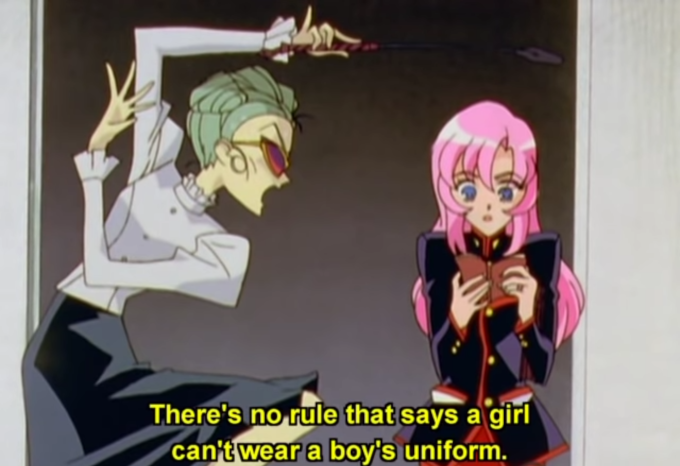
And then there’s the nature of Utena and Anthy’s friendship itself. From what I understand, Be Papas, the studio behind Utena, was unable to make any romance between Utena and Anthy explicit, given that they were lead characters in a popular television show in Japan in 1997. They were able to have Utena and Anthy finally kiss in the 1999 film, settling any debate about their relationship as near as I'm concerned, but as far as the original television show itself goes, Utena and Anthy are never able to confess their feelings. That said: my god, do they hold each other’s hands in the most tender way. Frequently. And that's just the tip of the iceberg! The show’s opening alone is just overflowing to the brim with gay energy, and that’s nothing to say of the content of the episodes themselves. Given how aggressively the show signals Utena and Anthy's queerness, I was honestly shocked to learn that some people actually interpret their friendship as platonic. If either character were male and nothing else about the show changed, there would be no doubt about their feelings for each other.
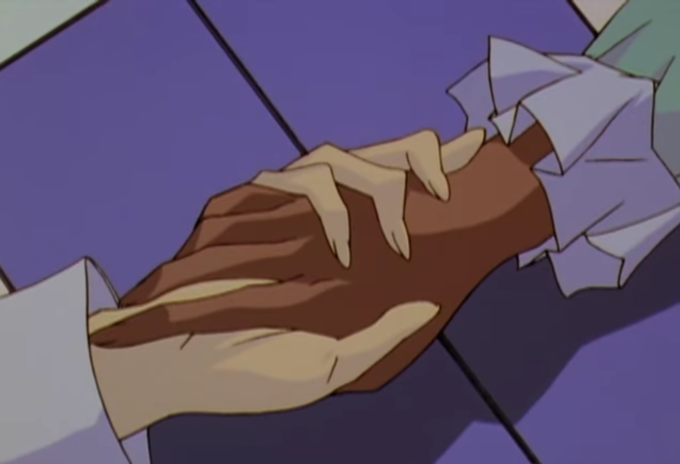
THERE IS NO HETEROSEXUAL EXPLANATION FOR THIS!
The fact that Utena is able to tell an all-but-undeniably queer love story despite its inability to make its core romance “explicit” still feels meaningful today. In an age where mainstream blockbuster films and shows still demonstrate cowardice through their refusal to include any meaningful portrayal of queer characters (yes, I am still mad about the overhyped blink-and-you'll-miss-it kiss between two female extras in the background in The Rise of Skywalker that we were supposed to be grateful to Disney for, thanks for asking), and people justify it by saying that “we can't put gay characters in blockbuster films without alienating the international market,” I can just point to Utena as an example of how people were able to tell queer stories in successful television shows, in nineteen-ninety-fucking-seven, in Japan, in spite the cowardice of producers. Be Papas was given a choice between removing queerness from their story and finding creative ways to communicate it, and they chose the latter. And then they made Utena and Anthy finally smooch on the big screen two years later. Good on them.
This isn't to say that the type of covertly queer narrative that Utena tells would be acceptable by today's standards. The lesbian representation feels bold and rebellious because of the show's historical context. You can't tell a gay love story like Utena's today because there is no longer any need to.
Speaking of the movie, my feelings about Adolescence of Utena are mixed, but I think it is essential to understanding the series as a whole, and it provides the story with its true ending. Also, you may have heard that Utena turns into a car in it, which is neat. I can't recommend Utena the show without recommending the film as well by pure necessity.
I love Revolutionary Girl Utena. A lot. There is so much to say about this series, but these video essays by Noralities (here and here) and Stushi (here and here) say most everything else I’d want to say better than I can. Neatly enough, you can also watch Revolutionary Girl Utena on Youtube (no subscription needed baby). If you’re an anime fan who hasn't seen Utena yet, I beg you to please give it a shot.
Sonny Boy (Madhouse, 2021)
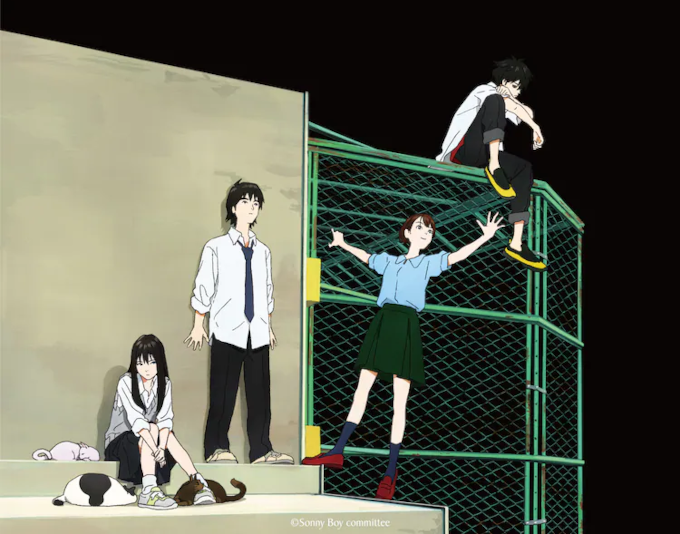
Speaking of visually surreal anime that just beg to have thinkpieces written about them – next on my list is Sonny Boy.
A class of students, their high school, and nothing else, are transported to a black void. Said high school students also develop psychic powers. The show deliberately hides anything else about its premise in its marketing, leading to an unexpected end-of-first-episode twist, so that’s all I’ll say about that.
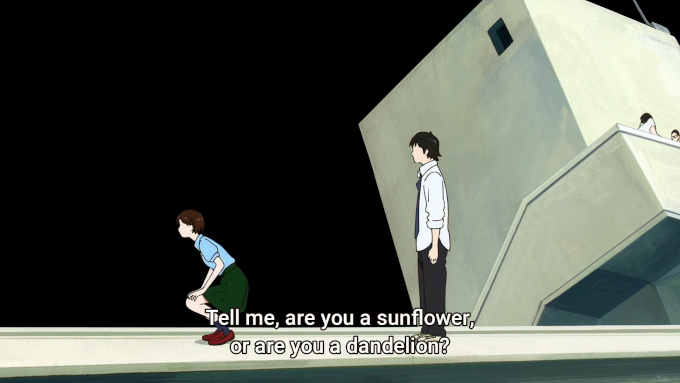
I was immediately drawn to Sonny Boy for Hishashi Eguchi's striking character designs, but the show as a whole is a creative, smartly written, and visually compelling journey that touches on existentialist themes. I love the ways that each character's personality, thoughts, and feelings are conveyed through their movements and posture. Every frame of animation feels expressive.
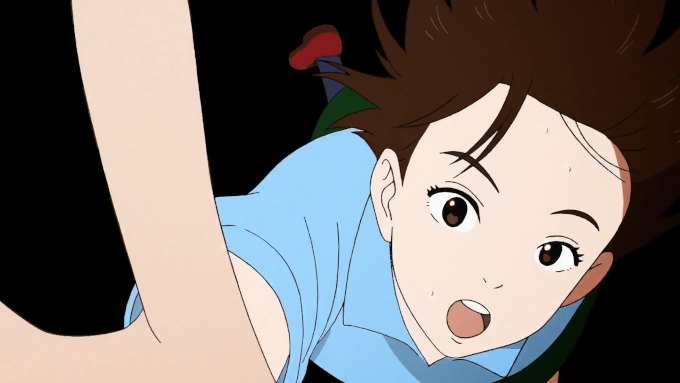
The last episode has one of my favorite animated sequences of all time, with two of the lead characters running across time and space, set to a phenomenal track by math rock band Toe. And I still find myself thinking about the show's very last scene.
Don’t be deceived by my relative lack of words here after my Utena ramble - it’s a downright beautiful show, and easily one of the best things I’ve watched in a long time. At only 12 episodes, it's a quick watch.
Omori (Omocat, 2020)
While the original 2014 trailer for Omori isn't the most accurate representation of the final game that was released 6 years later, it is my favorite trailer.
Looking at the screenshots and playing through the game’s opening, I was quick to dismiss Omori as a post-Undertale indie RPG that wore its Yumme Nikki influence on its sleeve but didn’t have its own voice, neither mechanically nor narratively. The game opens with the player controlling the titular character in a vibrant dream world, fighting enemies in a battle system that initially felt superficial, with a few jump scares scattered throughout. Something is amiss - in contrast to his friends, Omori himself never smiles, and is rendered in black and white instead of color - but I dismissed this detail as a transparent and oversimplified depiction of depression. Beyond the game’s distinctive art style, there otherwise appeared to be little else at play that other RPG Maker games hadn’t done before. I put the game down, and weeks passed before, out of boredom, I decided to give the game a second chance.
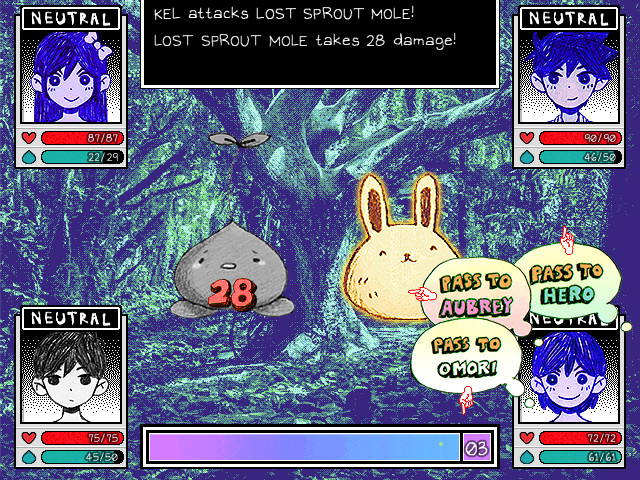
(Screenshots are from the Steam store page.)
As you might guess, my early impressions of the game were wrong. Omori is spectacular. As the game progresses, the particulars of the game’s emotion-based battle system slowly take prominence, necessitating you to understand its intricacies and manipulate your enemies’ emotions while managing your party’s. In most RPG's, the “fantasy dream world” that the game is set in would be just that - a setting that enables supernatural plot elements, eccentric characters, and ungrounded turn-based combat, but Omori uses the trope much more purposefully. Even though the game’s initial depiction of the protagonist’s depression seemed heavy-handed, Omori ultimately provides thoughtful explorations of themes of trauma, mental illness, suicidal ideation, grief, and escapism.
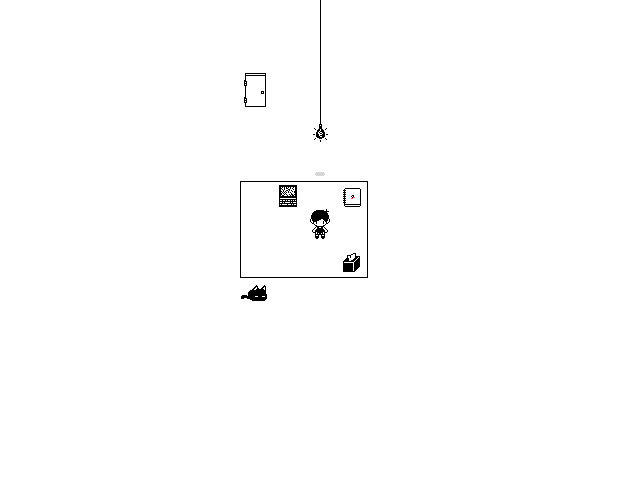
It is by no means a perfect game – Omori is Omocat’s first game, developed in their 20’s over a course of six-and-a-half years, and, admittedly, it sometimes shows. Sometimes the writing feels a little naive, and sometimes the design feels a little amateurish. However, one of the cool things about Omori is that you can also feel Omocat growing as a writer and designer over the course of the game. I know firsthand how challenging it is to iterate on a massive game over a long period of time, and not every creative decision made early in development can feasibly be revisited by the end.
That is to say: the game peaks when it counts. Its most important story beats, levels, and battles are handled masterfully, and the game’s ending itself is unforgettable. It is not hyperbolic for me to say that Omori has one of the most original and affecting ending sequences of a game I've had the pleasure of experiencing. The shot where Sunny stands back up, picks up his violin, and reassumes his playing position is permanently branded into my brain. I think about it once every month, on average.
The game doesn’t rest solely on its narrative and emotional payoff – along the way, you’ll get to experience stylish graphics, lovable characters, good jokes, and a memorable soundtrack (the game's composer did NOT need to go this hard on Sweetheart's battle theme). Despite its occasional unevenness and some padding in the middle of the game that obscure its heart, Omori, against my expectations, has become one of my favorite RPG's of all time.
Internal Logic (Grass Widow, 2012)
When I listened to Grass Widow's 2012 album Internal Logic last year, I was at a stage of my life where I was less likely to discover new music than was I to revisit forgotten albums and artists from my late teens and early 20’s. Back when I was a college student, or when I worked at a restaurant, or when I regularly played music with other people in Baltimore, I was more often among people who talked about music. However, my professional and social circles for most of my late 20’s weren’t as big on sharing good recommendations and albums as my older ones, and I have misgivings about using Spotify, which has fundamentally changed how people discover and share new music.
I don’t even know if Internal Logic was an album I just started listening to 2022, meeting my original year-in-review criteria, or if, more bleakly, it was just the most recent album at the time that I could remember listening to with fresh ears and liking.
I’ve been listening to Grass Widow for a long time, playing Past Time on loop as an undergrad, and I’ve always loved the mixture of the punkish, surf-y, driving energy of their compositions with their clean(-ish?) instrumentation and lovely vocal harmonies. “Spock on MUNI” is the standout track from that album for me, encapsulating the band's mixture of rawness and elegance. “All in your head… la la la la la la…” It's a solid album from start to finish.
Thanks for reading! I'd love to hear any thoughts about anything I covered in this post or any media you'd like to recommend in the comments below.
Longtime readers may have noticed that I've changed the blog's color scheme. Hopefully this makes it easier on the eyes than the bright-text-on-a-dark-background scheme that the blog used to have!
In other news, I am in the middle of a dramatic life change that I am not at liberty to discuss online at the moment. Otherwise, I am making steady progress on Jailbird Nocturne's final chapter, and am hoping to polish it up, playtest it, and release it before the end of the year. Thanks to everyone who played and enjoyed the demo I brought to Philly Game Mechanics' inaugural post-COVID playtest night! Your encouragement means a lot.